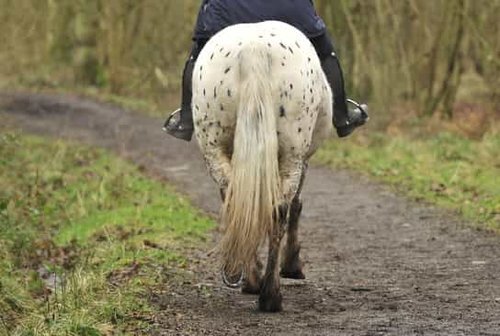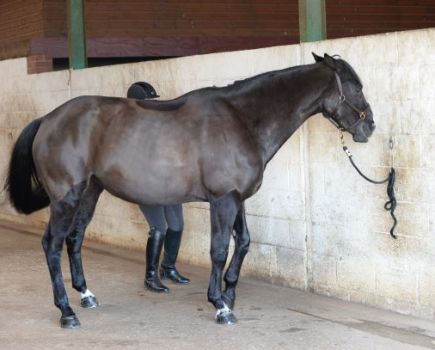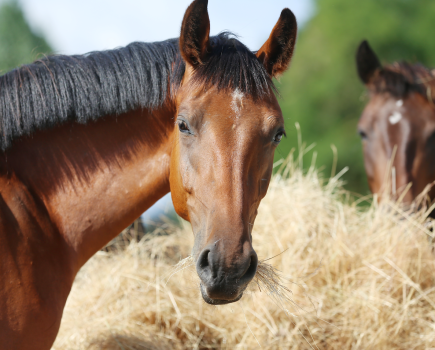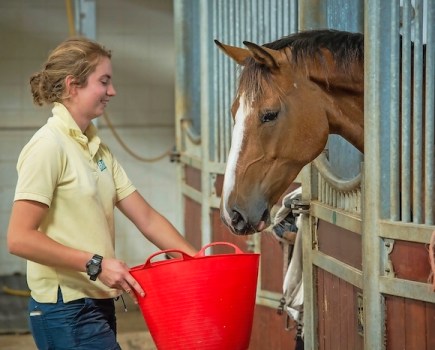With more than 50% of the UK’s equine population overweight, are owners struggling to recognise the signs? Libby Smith from the British Equine Veterinary Association explains why we all need to start taking responsibility for reducing our horses’ weight.
The UK’S equestrian community is facing a burgeoning problem that — worryingly — many people don’t recognise as a welfare issue.
Given that 50% of the equine population in the UK is already overweight, clearly horse owners are struggling to either recognise the signs that their horse is heavier than he should be, or they aren’t sure why being overweight poses such a risk to his health.
In recent research collated by a leading feed manufacturer, horse owners were asked to identify which horses were overweight from photographs.
Out of the 539 individuals who took part, only 11% correctly identified all of the horses who needed to lose weight.
While this wasn’t conducted as a scientific trial, it does highlight that more support should be provided to horse owners and the wider equine community to better identify which horses fall into the overweight category.
Why is being overweight so bad?
- Orthopaedic disorders
There are myriad secondary health complications linked to being overweight.
In young horses, too much weight on developing skeletal systems can result in orthopaedic disorders.
We typically think of this being an issue in young horses who start ridden work too early, but it can also be caused by excess weight on a young frame.
This can cause immediate discomfort and limit long-term athletic ability.
Similarly, in horses with arthritis, the more they weigh, the more uncomfortable they will be, as the owner will be placing more weight on a load-bearing surface that is already damaged.
This mirrors NHS information in the human field that identifies being overweight as a trigger for back pain — for which a treatment is weight loss.
- Reduced performance
Another more subtle outcome of being overweight is a reduction in performance.
You might be feeding your horse a diet that’s designed to give him energy, and may feel it now doesn’t make sense that he seems more lethargic and lacks the speed and/or stamina he once had.
For anyone who has returned to exercise following a Christmas break, or an indulgent holiday with access to an all-you-can-eat buffet, those first few sessions can feel extra hard.
You keep breaking into walk when you’re supposed to be running, you lack the strength to lift the weights you did before, and everything feels like a huge challenge.
This is similar to how your horse feels after too much free access to the grass buffet — the more we weigh, the harder it is to perform.
There’s a reason why the likes of Mo Farah, Eliud Kipchoge and other elite marathon runners are all lean.
It’s the same reason we expect elite performance horses to be lithe and well-muscled in order to perform at their best.
- Hormonal problems
One of the biggest complications of being overweight is the development of a hormonal disorder called insulin resistance, which is often confused and linked to equine metabolic syndrome (EMS).
EMS is a term given to horses who demonstrate three problems: a history, or current episode, of laminitis; focal fat deposition (regional adiposity); and insulin resistance (IR).
EMS is a man-made disorder that is reflective of overeating and underactivity and, in this respect, it is similar to type 2 diabetes in humans.
In order to say that a horse has EMS, he must present with all three of these problems. It is possible to have a horse with IR who doesn’t have EMS because he doesn’t have laminitis.
But this is still a problem and could lead to laminitis and therefore EMS in the future. However, the term EMS doesn’t apply in this instance and the management that will be recommended will therefore be different.
The take home message
It has become increasingly hard to identify a horse who is overweight because the more overweight horses people see, the more normal this vision becomes.
So, if 50% of the horses around you are already overweight, how easy is it then to pick out your own horse from this crowd and begin to manage him in a different way?
This is a multi-faceted issue that requires us to challenge ourselves, those around us, the professionals winning in the show ring with overweight horses, and the feed manufacturers supplying us with well-marketed feed that we don’t always need.
However, this vital, brave step can lead to healthier, happier and fitter horses than we’ve ever enjoyed before.
Don’t miss the latest issue of Your Horse Magazine, jam-packed with training and veterinary advice, horse-care tips and the latest equestrian products, available now.










